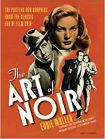Difference between revisions of "The Art of Noir by Eddie Muller"
| Line 1: | Line 1: | ||
| − | {{ | + | {{infobox1 |
|title=The Art of Noir | |title=The Art of Noir | ||
|sort=Art of Noir, The | |sort=Art of Noir, The | ||
| Line 12: | Line 12: | ||
|publisher=Overlook Duckworth | |publisher=Overlook Duckworth | ||
|date=November 2014 | |date=November 2014 | ||
| − | |||
| − | |||
| − | |||
| − | |||
|summary=Forgetting a couple of tiny niggles, this is a perfect guide, for laymen and specialists, to a major side of American studio system cinema. | |summary=Forgetting a couple of tiny niggles, this is a perfect guide, for laymen and specialists, to a major side of American studio system cinema. | ||
| + | |cover=0715647687 | ||
| + | |aznuk=0715647687 | ||
| + | |aznus=1468307355 | ||
}} | }} | ||
Colour is surely not the first thing one associates with film noir – after all, the clue is in the name. ''The Third Man'' is only better with the shadows, Fritz Lang never needed gaudy colour, and the whole genre of noir would have been very different if it had been born in Technicolor. But it did live into the era of Cinemascope and colour pictures, and it was never advertised as black and white, as these superb images testify. The large postcards and posters that adorned American picturehouse lobbies to plug the films on offer were always lurid, vivid and extremely colourful. And this book is just as colourful – as well as erudite, comprehensive and extremely entertaining. | Colour is surely not the first thing one associates with film noir – after all, the clue is in the name. ''The Third Man'' is only better with the shadows, Fritz Lang never needed gaudy colour, and the whole genre of noir would have been very different if it had been born in Technicolor. But it did live into the era of Cinemascope and colour pictures, and it was never advertised as black and white, as these superb images testify. The large postcards and posters that adorned American picturehouse lobbies to plug the films on offer were always lurid, vivid and extremely colourful. And this book is just as colourful – as well as erudite, comprehensive and extremely entertaining. | ||
Latest revision as of 13:19, 6 April 2018
| The Art of Noir by Eddie Muller | |
|
| |
| Category: Entertainment | |
| Reviewer: John Lloyd | |
| Summary: Forgetting a couple of tiny niggles, this is a perfect guide, for laymen and specialists, to a major side of American studio system cinema. | |
| Buy? Yes | Borrow? Yes |
| Pages: 288 | Date: November 2014 |
| Publisher: Overlook Duckworth | |
| ISBN: 9780715647684 | |
|
| |
Colour is surely not the first thing one associates with film noir – after all, the clue is in the name. The Third Man is only better with the shadows, Fritz Lang never needed gaudy colour, and the whole genre of noir would have been very different if it had been born in Technicolor. But it did live into the era of Cinemascope and colour pictures, and it was never advertised as black and white, as these superb images testify. The large postcards and posters that adorned American picturehouse lobbies to plug the films on offer were always lurid, vivid and extremely colourful. And this book is just as colourful – as well as erudite, comprehensive and extremely entertaining.
This could be one of the easier reviews to write, for this book almost flawlessly does what it says on the tin, and you might not wish to know more. But I will be polite and turn the tin round in front of you to see all that that entails. The first chapter starts by itemising the various movie studios' inhouse styles of lobby poster, and they are certainly varied enough to be instantly recognisable, from the classy memento style of Warners to the ungainly mess of images and star names of MGM. The worth of this book to the collector continues with an early focus on how foreign countries ended up presenting American noir in their own ways – Germany with its clever artwork, Sweden borrowing the none-more-impactful black, white and red of a certain WWII regime for theirs. We trawl enjoyably through the various elements noir gave us – the woman with a gun, the gullible journalist out of his depth, the corrupt cop on the make – and hit on the various star faces and major names behind the cameras that made these decades of cinema history so unique. And as this last came out twelve years ago we get some newer, DVD-extra samples of our author's archive.
It's an archive that is presented to us very well indeed. I'll gloss over the various times I read the pages as per the order of writing and not the images – some times I was reading about an image before the main body of text (if you can call short, snappy and perfectly written introductory paragraphs a main body) had got me there. It's an instance of how well the book is produced that I have no idea what kind of rostrum camera could even begin to capture the image of a poster that's two whole metres square, but everything here looks as pristine as could be imagined, and as clearly presented as anyone would wish (bar one of those said introductions over-running and losing its closing lines).
This book then – a hefty, coffee table one if ever there was one – is great for the cinema fan and the historian of art. Some of the images are less than completely salubrious (one of the people pictured seems to have been known for hitting the women in his films as a recurring character trait), but all are interesting. And it will permanently change the way one considers noir. These posters make The Lady from Shanghai so much more exotic. The small cast lists remind us of some of our favourite actors of the many decades since. And they give us a small glimpse of what might have been had colour movies been more prevalent more early – The Maltese Falcon would look so much different with vivid red frocks on show. So while for me noir will on the whole remain in black and white – chiaroscuro would never work in colour – this book will remain the ideal companion for anyone who's ever had any affinity with the genre, however they may have seen it presented.
I must thank the publishers for my review copy.
If you want to read noir, there is The Return of the Thin Man by Dashiell Hammett. If you seek images of Hollywood, we recommend Hollywood Frame by Frame: Behind the Scenes: Cinema's Unseen Contact Sheets by Karina Longworth for being similarly self-explanatory and comprehensive.
Please share on: ![]() Facebook,
Facebook, ![]() Twitter and
Twitter and
![]() Instagram
Instagram
![]() You can read more book reviews or buy The Art of Noir by Eddie Muller at Amazon.co.uk Amazon currently charges £2.99 for standard delivery for orders under £20, over which delivery is free. (Paid link)
You can read more book reviews or buy The Art of Noir by Eddie Muller at Amazon.co.uk Amazon currently charges £2.99 for standard delivery for orders under £20, over which delivery is free. (Paid link)
![]() You can read more book reviews or buy The Art of Noir by Eddie Muller at Amazon.com. (Paid link)
You can read more book reviews or buy The Art of Noir by Eddie Muller at Amazon.com. (Paid link)
Comments
Like to comment on this review?
Just send us an email and we'll put the best up on the site.


